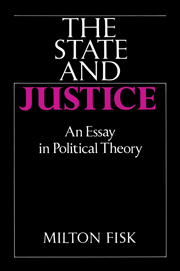Book contents
- Frontmatter
- Contents
- Preface
- Introduction: Can the state rule without justice?
- Part One An outline of a materialist political theory
- Part Two An assessment of the place of justice in the state
- Part Three A functional view of political institutions
- Part Four An account of the community of states
- 17 Global justice
- 18 The imperial state
- 19 Peace through strength
- 20 The Soviet Union as other
- Part Five A reflection on the transition to a new kind of state
- Conclusion: State, class, and democracy
- Notes
- Index
- Frontmatter
- Contents
- Preface
- Introduction: Can the state rule without justice?
- Part One An outline of a materialist political theory
- Part Two An assessment of the place of justice in the state
- Part Three A functional view of political institutions
- Part Four An account of the community of states
- 17 Global justice
- 18 The imperial state
- 19 Peace through strength
- 20 The Soviet Union as other
- Part Five A reflection on the transition to a new kind of state
- Conclusion: State, class, and democracy
- Notes
- Index
Summary
A speculative effort is called for to discuss international relations. The atomistic philosophy of current political theory has led nowhere. There is, then, some excuse for taking a daring step that adopts a holistic approach. The relations of state will be viewed from within the framework of the international economy. From this perspective, it is easier to see how justice, rather than force alone, can play an important role among states.
The international essence of the state
The modern analytical approach in philosophy is summed up by its emphasis on the part rather than the whole. When this approach is brought to bear on the state, the goal of political theory becomes knowledge of the state taken in isolation. To advance to international relations, it should suffice to make deductions from this knowledge of the state in isolation. That in any event would be to follow the advice of Descartes, one of the founders of the analytical approach. He urged that we first reduce complex propositions to simple ones and then by an inspection of the simple ones advance to a genuine knowledge of the complex ones.
It is remarkable that so many political theorists treat the state as an island, assuming that its relations to economies, nations, and states somewhere offshore will be external to its insular essence. This approach is adopted by those theorists who, like Ernest Barker, treat the state as a legal association that functions to promote the national common good.
- Type
- Chapter
- Information
- The State and JusticeAn Essay in Political Theory, pp. 221 - 232Publisher: Cambridge University PressPrint publication year: 1989

